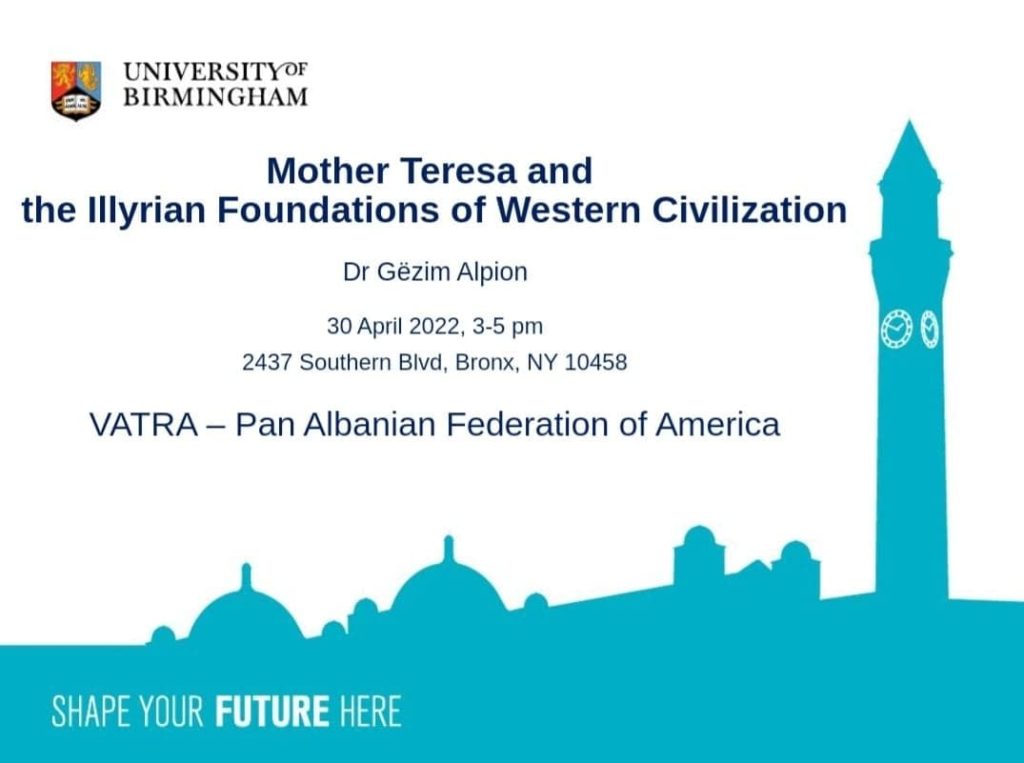
NESER TE VATRA “Shenjtorja Nënë Tereza” – Leksion dhe Bashkëbisedim në Vatër / Ftohet komuniteti shqiptar në New York e më gjërë që të marrë pjesë
Topic: Mother Teresa and the Illyrian Foundations of Western Civilization.
Abstract: Employing the life, missionary work and legacy of Albanian-born Saint Teresa of Calcutta as a case study, over the last twenty years Gëzim Alpion has argued that not only Christianity remains firmly embedded in the Illyrian tradition but that it also constitutes one of the long-ignored links between modern Albanians and their Pelasgo-Illyrian ancestors. Equally important, he contends that Mother Teresa’s ethno-spiritual roots, and her own attitude towards and application of the Christian faith illustrate some perennial features of her nation’s spiritual tradition that can be traced in the ancient Illyrians’ belief systems. Drawing on his main publications – Mother Teresa: Saint or Celebrity? (Routledge 2007) and Mother Teresa; The Saint and Her Nation (Bloomsbury Academic 2020 and 2022) – and work in progress on Mother Teresa’s ‘Dark Night of the Soul’, in his talk Alpion argues that this sainted nun’s understanding and application of Christianity offer new evidence that ancient Illyrian civilization is at the heart of the triadic composition of ancient European civilization, and that Illyrians played a key role in laying the foundations of ancient Greece and Rome. Alpion concludes that ancient Illyria paved the way for the emergence of ancient Greek and Roman civilisations just as Mother Teresa’s formative years are vital to understanding the extraordinary religious and humanitarian figure she eventually became. This causality, he advises, requires further cooperation between Albanian and non-Albanian scholars which, in turn, would, hopefully, make scholarship about Albania less dependent on ‘freelance’ type specialists.
Dr. Gëzim Alpion
The University of Birmingham, UK
Brief Biography
Gëzim Alpion has a BA from Cairo University and a PhD from Durham University, UK. He lectured at the Universities of Huddersfield, Sheffield Hallam and Newman before joining the Department of Sociology at the University of Birmingham, UK, in 2002. His specializations encompass the sociology of religion, nationalism, fame, race, media, film and authorship.
His main publications include ‘Mother Teresa: Saint or Celebrity?’(Routledge, 2007), ‘Encounters with Civilizations: From Alexander the Great to Mother Teresa’ (Routledge, 2017), ‘Mother Teresa: The Saint and Her Nation’ (Bloomsbury, 2020) and a number of studies in academic journals and edited collections. Sponsored by Arts Council England, Alpion’s plays ‘Vouchers: A Tragedy’ (2001) and ‘If Only the Dead Could Listen’ (Globic Press, 2008) were well-received by both audiences and critics in England in the 2000s. Alpion’s features and op-eds have appeared in a number of international newspapers and magazines including ‘The Guardian’, ‘The Independent’, ‘The Conversation’, ‘The Tablet’, ‘Hindustan Times’, ‘The Middle East Times’, and ‘The Hürriyet Daily News’.
In his recent publications Alpion has explored the concept of charism/a from a sociological and public theology perspective, Enoch Powell’s populist rhetoric in the context of the eugenics discourse, and the reasons for the absence of modern spiritual icons in celebrity studies. An editorial board member for various scholarly journals, including ‘Celebrity Studies’ (Routledge), Alpion is currently developing the idea of ‘fame capital’ as a variable in an intranational and international context, examining ‘the Dark Night of the Soul’ phenomenon from a sociological perspective, and exploring the role of religion in fabricating national identity. In recent years, Alpion has delivered over 70 keynote addresses and talks in 15 countries.
Alpion is considered “the most authoritative English-language author” on St Teresa of Calcutta, “the founder of Mother Teresa Studies”, and “one of the most intelligent and acute observers on the subject of Albanian culture”. He received the ‘Ambassador of Nation Award’ and the ‘Mother Teresa Award’from the Prime Minister and the President of Albania in 2019 and 2021, respectively.
Contribution to Mother Teresa Studies
Over the last two decades, Alpion has explored a number of aspects of Mother Teresa’s life and work as a private individual and public personality, arguing that they complement each other. Here are some of Alpion’s contentions in his publications and work in progress on this sainted woman.
A charismatic personality of Mother Teresa’s calibre and global reach does not come about by chance. To provide a well-rounded portrait of this influential figure, one needs to approach her in the context of her familial background, ethnic, cultural and spiritual milieus, the Albanian nation’s spiritual tradition before and after the advent of Christianity, and the impact of the Vatican and other influential powers on her people since the early Middle Ages.
Mother Teresa’s childhood traumas, ordeals and achievements indicate that her life and her nation’s history, especially her countrymen’s relationship with Roman Catholicism, are interconnected. Unravelling this interconnectedness is essential to understanding how this modern spiritual and humanitarian icon has come to epitomise her ancient nation’s cultural and spiritual DNA, and provide further evidence of the triadic – Illyro-Greco-Roman – foundation of ancient European civilisation.
Mother Teresa played an active role in the construction of her public imagesince the inception of the Missionaries of Charity in the late 1940s. She understood the value and power of mass communication before this became the focus of the Second Vatican Council.
Although essentially a spiritual person, Mother Teresa was not above and beyond politics. Throughout her missionary life, this charismatic ‘revolutionary’ never tired of building bridges like few other influential personalities.
Mother Teresa literature continues to suffer from polarised views about her work and legacy held by her supporters and detractors. Mother Teresa Studies, on the other hand, is still at an early stage. One of its challenges is to bridge the chasm between these two opposing camps. This is paramount to fathoming one of the most complex and enduring personalities of the modern age.